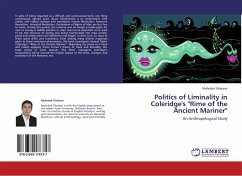In spite of being regarded as a difficult and controversial term, one thing unanimously agreed upon about Romanticism is its endowment with drastic and radical changes and transitions; French Revolution, American Revolution, Industrial Revolution, Declaration of Rights of Man are but few to name. During this period, the universe was no longer a stable place for man to occupy a middle position in; man was not as important as he used to be; the structure of society was being transformed into mass society; poets and artists were not indifferent and began, in their turn, to react to these great shifts and transitions; from among many diverse responses given to these enormous phenomena, this book investigates Samuel Taylor Coleridge s Rime of the Ancient Mariner . Regarding the poem as a ritual and mainly applying Victor Turner s theory of ritual and liminality, this book shows in what manner "The Rime" represents Coleridge s sociopolitical stance toward the holistic impact of the shifts, changes, and transitions of the Romantic era.








